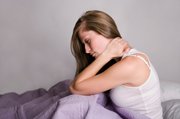Advertisment
Poor sleep link to urinary problems

Disordered sleep preceded development of urinary symptoms by as much as five years in men and women, according to researchers.Short sleep duration and sleep disturbance doubled the likelihood of lower urinary tract symptoms (LUTS) in men and increased the risk in women by 66%.
Disordered sleep was associated with an 80% to 90% increase in women’s odds for urinary incontinence and nocturia.
The findings suggest that the association between sleep disturbance and urinary symptoms goes in both directions, Raymond Rosen, PhD, said during a press briefing at the American Urological Association meeting.
“We’re suggesting this is probably a bidirectional relationship,” said Rosen, of New England Research Institute in Watertown, Mass. “We think of the patient with LUTS or nocturia as having disturbed sleep, and that in turn produces quality-of-life problems or health problems for that individual.
“This presentation is suggesting that we should also think of the reverse. Someone who has chronic sleep difficulties is at significantly increased risk of urologic problems, and we want to understand more about that.”
As Rosen pointed out, sleep disturbance and urologic symptoms have a long-standing association. Clinical concepts regarding the association have focused on a unidirectional relationship wherein the urinary symptoms lead to sleep disturbance.
However, equally plausible is the possibility that sleep disturbance leads to urologic symptoms because of the former’s association with obesity and systemic inflammation, according to Rosen and colleagues.
So they performed a prospective cohort study to determine whether sleep predicts subsequent development of urinary incontinence, LUTS, and nocturia.
Statistical analyses included 1,610 men and 2,535 women who participated in the Boston Area Community Health (BACH) study, a population-based random-sample survey.
BACH participants completed a baseline survey during 2002 to 2005 and a follow-up survey during 2006 to 2010. The participants reported no urinary symptoms at baseline.
Baseline short sleep duration was defined as less than five hours per night, moderate-to-severe LUTS as an AUA Symptom Score ≥8, urinary incontinence as weekly urine leakage, and nocturia as two or more urinations nightly after falling asleep.
The investigators developed logistic regression models adjusted for age, race/ethnicity, diabetes, heart disease, alcohol use, physical activity, and baseline antidepressant use. To test for mediation of associations, they further adjusted for BMI and baseline CRP levels.
The study population had a mean baseline age of 48. As indicated by responses to the initial survey, 18% of men had short sleep duration, and the prevalence of restless sleep was 34% among men and 42% among women. No data were available on the prevalence of short sleep duration in women.
During follow-up, 8% of men and 13% of women developed LUTS, which was significantly associated with short sleep duration (OR 1.97, 95% CI 1.02 to 3.78) and restless sleep in men (OR 2.03, 95% CI 1.26 to 3.28) and with restless sleep in women (OR 1.66, 95% CI 1.10 to 2.49).
Restless sleep was associated with significantly higher rates of urinary incontinence (13.0% versus 7.1% in women with normal sleep) and nocturia (25.1% versus 13.5%).
Women reporting disturbed sleep had a 78% increase in the odds for urinary incontinence (OR 1.78, 95% CI 1.06 to 2.96) and almost a twofold increase in the odds for nocturia (OR 1.90, 95% CI 1.26 to 2.88).
Restless sleep did not significantly affect the rate of either urinary symptom in men.
Results were similar after adjustment for BMI. The associations remained significant after adjustment for baseline CRP values, but were considerably lower, suggesting possible mediation of the relationships by inflammatory mechanisms.
The existence of a bidirectional relationship between disordered sleep and urinary symptoms is entirely plausible and has been suggested by other investigators, said press briefing moderator Tomas Griebling, MD, of the University of Kansas in Kansas City.
The mediating effect of CRP on the relationship between sleep and urologic symptoms is fascinating, plausible, and warrants further investigation, he added.
Disclosure:
The authors had no relevant disclosures.
Reference:
Araujo AB, et al “Sleep predicts the development of urologic symptoms in a longitudinal study” AUA 2011. Abstract 57





